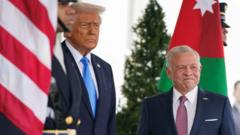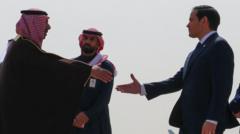In a recent meeting at the White House, President Donald Trump reiterated his controversial proposal to take control of the Gaza Strip and resettle its Palestinian population in neighboring countries, especially Jordan. Despite King Abdullah's firm rejection, Trump maintained that this plan would lead to regional economic growth and improved living conditions for Palestinians.
**Trump Reaffirms Controversial Gaza Takeover Proposal During Meeting with King Abdullah**

**Trump Reaffirms Controversial Gaza Takeover Proposal During Meeting with King Abdullah**
President Trump's insistence on U.S. control of Gaza faces rebuke from Jordan amid international law concerns.
Trump’s insistence continues to provoke widespread criticism, as Jordan – already home to millions of Palestinians – seeks to avoid further displacement and has firmly stated its opposition to his plans. Following discussions, both leaders conveyed their contrasting viewpoints on the best approach for the future of Gaza and the well-being of its people.
King Abdullah, while presenting a united Arab position against forced displacement and emphasizing the necessity of rebuilding Gaza without displacing its inhabitants, signaled potential avenues for cooperation in addressing the humanitarian crisis in the region. This meeting highlights the delicate balance political leaders must maintain amidst conflicting interests in the ongoing Israeli-Palestinian conflict.
With international legal frameworks prohibiting forced population transfers and recent backlash against Trump’s plans, the situation surrounding the Gaza Strip continues to draw significant scrutiny on a global scale.
The ongoing debate emphasizes a need for collaborative solutions that respect the rights and voices of the Palestinian people while considering the ramifications for regional stability and humanitarian welfare. The upcoming discussions with Egypt and other Arab states may shape the future strategies and governance structures for Gaza, ultimately testing the implications of Trump’s original proposal.
King Abdullah, while presenting a united Arab position against forced displacement and emphasizing the necessity of rebuilding Gaza without displacing its inhabitants, signaled potential avenues for cooperation in addressing the humanitarian crisis in the region. This meeting highlights the delicate balance political leaders must maintain amidst conflicting interests in the ongoing Israeli-Palestinian conflict.
With international legal frameworks prohibiting forced population transfers and recent backlash against Trump’s plans, the situation surrounding the Gaza Strip continues to draw significant scrutiny on a global scale.
The ongoing debate emphasizes a need for collaborative solutions that respect the rights and voices of the Palestinian people while considering the ramifications for regional stability and humanitarian welfare. The upcoming discussions with Egypt and other Arab states may shape the future strategies and governance structures for Gaza, ultimately testing the implications of Trump’s original proposal.





















